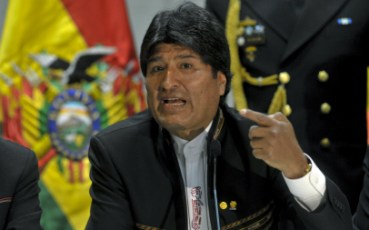Russian lawmakers are encouraging National Security Agency whistleblower Edward Snowden to accept asylum in Venezuela after an offer by Venezuelan President Nicolás Maduro. Speaking to a military parade on Friday, Maduro contrasted his asylum offer to Edward Snowden with the U.S. refusal to deport former CIA operative Luis Posada Carriles, who is wanted for the bombing of a Cuban airliner that killed 73 people.
Venezuelan President Nicolás Maduro: “Who is the terrorist? A government like us, who seeks to serve the young Snowden, a figure of humanitarian asylum, from persecution by the American empire? Or the United States government, that protects with political asylum Luis Posada Carriles, a confessed convicted murderer and terrorist who is wanted by Venezuela for the bombing of the Cubana plane in 1976?”
Bolivian President Threatens Closure of U.S. Embassy in Snowden Row
Bolivia and Nicaragua have also expressed their willingness to grant NSA whistleblower Edward Snowden asylum. The offers to Snowden came after a plane carrying Bolivian President Evo Morales was rerouted to Austria after France and Portugal barred it from their airspace over false suspicions that Snowden was on board. After hosting an emergency summit of Latin American leaders, Morales threatened to close the U.S. embassy in Bolivia.
Bolivian President Evo Morales: “If it were necessary, I would close the U.S. embassy in Bolivia. We are not in need of a U.S. embassy in Bolivia. We do not need its pretext of cooperation or diplomatic relationship. They come to conspire against us from inside and out.”
Brazil Voices “Deep Concern” over Report of NSA Surveillance
In the latest of Edward Snowden’s disclosures, the journalist Glenn Greenwald revealed this weekend the National Security Agency has systematically tapped into Brazil’s telecommunication network and indiscriminately intercepted, collected and stored the email and telephone records of millions of Brazilians for years. The Brazilian government says it has “deep concern” over the report and has asked the U.S. embassy for an explanation.
Report: FISA Court Used Expanded Definition of “Relevant” to Enable Mass Spying
The National Security Agency’s wholesale gathering of U.S. phone records was enabled by a previously unknown decision by the Foreign Intelligence Surveillance Act Court. Under the PATRIOT Act, businesses can be forced to turn over customers’ records if investigators can prove they’re “relevant to an authorized investigation.” The Wall Street Journal reports that in a series of orders dating back to the mid 2000s, the FISA Court, or FISC, endorsed an expansion of the word “relevant” to mean “an entire database of records on millions of people.” In interviews, the Senate’s two leading critics of NSA surveillance, Ron Wyden and Mark Udall, confirmed that the expansion of what constitutes “relevant” is what they’ve meant in long accusing the government of a “secret interpretation” of the PATRIOT Act.
Anti-Surveillance “Restore the Fourth” Protests Held Across U.S.
Protests were held across the United Statess on the Fourth of July to protest warrantless and sweeping government surveillance. The rallies were called by the new group Restore the Fourth, a reference to the constitutional protection against illegal search and seizure. Hundreds of marchers turned out in cities including San Francisco, Los Angeles, New York City, and Washington, D.C.
Group to Challenge NSA Spying Before Supreme Court
The Electronic Privacy Information Center is filing an emergency petition today asking the U.S. Supreme Court to halt the National Security Agency’s collection of millions of phone records. The group says their lawsuit is the first to directly challenge the authority of FISA courts to authorize the collection of phone data under the PATRIOT Act.
Report: U.S. Postal Service Surveillance Program Tracks Every Piece of Mail
As the outcry over National Security Agency spying continues, the U.S. Postal Service is now under scrutiny for a surveillance program of its own. The New York Times has revealed the postal service has been carrying out a Mail Isolation Control and Tracking program, which photographs every piece of mail in its system. Around 160 billion envelopes, packages, and postcards were documented last year. The contents are never read without a warrant, but they allow investigators to learn key information including “names, addresses, return addresses and postmark locations.” The information was reportedly used to nab the suspect recently accused of mailing ricin-laced letters to President Obama and New York City Mayor Michael Bloomberg. Leslie James Pickering, a former activist with the Earth Liberation Front who now owns a small bookstore in Buffalo, recently learned his mail was being monitored after a surveillance order was accidentally delivered to his door.






